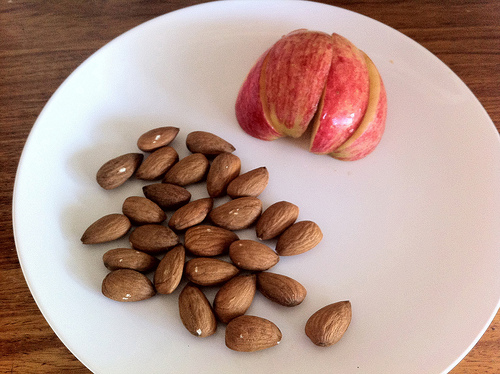Paleo Diet - Day 1
Today was my first official day on the Paleo Diet and it was a positive experience overall. I had trialled a few paleo meals over the past few days but decided to wait until today as I attended a wedding yesterday and I doubt they would have appreciated me requesting paleo foods at such late notice. Some people can be so touchy. I guess those earlier paleo meals could be seen as a bit of cheat. It means I had a few days easing myself into this new eating habit so my body could be already adjusting to this eating style but I decided the purpose of this paleo test is not to see what negative results I have (e.g. carb withdrawal, cravings) but rather what positive effects this diet has on my life. So without further ado let's see how day one went (with pictures!)
Day 1 in Pictures
Breakfast
 Breakfast was delicious. Two eggs and 1.5 rashes of bacon, fried in olive oil, plus half an apple and a handful of blueberries.
Breakfast was delicious. Two eggs and 1.5 rashes of bacon, fried in olive oil, plus half an apple and a handful of blueberries.
Snack
 Mid-morning snack of half an apple and a handful of almonds.
Mid-morning snack of half an apple and a handful of almonds.
Lunch
 Lunch was post-gym so I whipped up my standard salad (lettuce, capsicum, tomato, carrot) and added leftover chicken sausages and the left over rash of bacon from breakfast. Yummy.
Lunch was post-gym so I whipped up my standard salad (lettuce, capsicum, tomato, carrot) and added leftover chicken sausages and the left over rash of bacon from breakfast. Yummy.
Snack v2
 I was a little hungry coming into late afternoon and so I polished off 2 boiled eggs and 3 brazil nuts The brazil nuts are a tip I took from Tim Ferriss about their selenium content and the effect on sperm production and testosterone levels. The eggs? Well I just love eggs!
I was a little hungry coming into late afternoon and so I polished off 2 boiled eggs and 3 brazil nuts The brazil nuts are a tip I took from Tim Ferriss about their selenium content and the effect on sperm production and testosterone levels. The eggs? Well I just love eggs!
Dinner
 Grilled Salmon, green beans, and a small serving of Zac Salad (that's lettuce, tomato, capsicum, and carrot for those that missed it). This was the biggest unknown for me as I've never been big on Salmon before but this meal surprised me. It was fantastic and I will be having Salmon again in the future.
Grilled Salmon, green beans, and a small serving of Zac Salad (that's lettuce, tomato, capsicum, and carrot for those that missed it). This was the biggest unknown for me as I've never been big on Salmon before but this meal surprised me. It was fantastic and I will be having Salmon again in the future.
So that's everything I ate. How did it all go?
Taste
Beautiful. All food was fresh and delicious. The meals and snacks were good combinations of different areas and I made sure I got my lean protein fix for every meal. I could definitely eat like this for a long time with no concerns for boredom or taste.
Hunger
I did not experience much hunger today. In fact I would say my hunger was less than a normal carb-filled day. It was weird though. Normally I will get hit with a sudden urge of hunger around lunch time and I have to rush out to get food, and lots of it! Today I would eat a meal and feel satisfied and then an hour later my stomach felt empty. I was not hungry per se, but not full. It was definitely something different but probably more how our bodies should feel after food.
My Biggest Concern - Weight Loss
I know most people will hate me for saying that my biggest concern is losing weight but it's true. I weighed in at 81kg this morning (after breakfast) and I don't want that to drop. I'd prefer to be gaining weight (muscle) which is the whole point of the gym work but it adds more tension around the issue of ensuring that I eat enough food. I need to be able to live a paleo lifestyle, work out, and still be able to build muscle.
With that in mind I did something I told myself I was not going to do - measure my calories. In the past when I have started tracking my calorie intake (normally to ensure I eat enough to bulk up at the gym) I tend to go a little over the top with it. I wanted to do this diet without measuring everything but I decided that I needed to see how much this day has been worth first to determine if I will waste away or not.
Energy In: 1948 Calories Protein: 147 grams (31.6% of total energy intake) Fat: 127 grams (59.4% of total energy intake) Carbs: 45 grams (9% of total energy intake)
Not great. I think I need a fair bit more food if I am going to gain muscle from busting weights at the gym. I will give the paleo method a trial and see what effect it has on my body but I am thinking the future might include things like potatoes just to pad it out a bit. We'll see.
Day 1 down!






